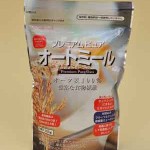Health officials in Hong Kong discovered low levels of Cesium in samples of oatmeal imported from Japan but have declared that there is no risk involved with consuming the product as the levels are not considered dangerous. Even if Hong Kong residents were to consume large amounts of the oatmeal, there would be no adverse effects, officials said, and so the suprmarket was not ordered to issue a recall.
“The internal dose of radioactive substances of high consumers from consuming the oats sample for one year is approximately 0.003 millisievert (mSv), far less than the radiation dose received during a chest X-ray examination (about 0.05 mSv),” a spokesman for the Centre for Food Safety (CFS) of the Food and Environmental Hygiene Department said.
 CFS has been conducting radiation testing on foods imported from Japan since March 2011, when equipment failures and nuclear meltdowns at the Fukushima Daiichi Power Plant in Japan released radioactive materials into the atmosphere on a scale not seen since the Chernobyl disaster of 1986. Because CFS is aware of public concern about radioactivity in food products imported from Japan, it makes information about testing available to consumers whether or not test results pose a health risk.
CFS has been conducting radiation testing on foods imported from Japan since March 2011, when equipment failures and nuclear meltdowns at the Fukushima Daiichi Power Plant in Japan released radioactive materials into the atmosphere on a scale not seen since the Chernobyl disaster of 1986. Because CFS is aware of public concern about radioactivity in food products imported from Japan, it makes information about testing available to consumers whether or not test results pose a health risk.
“The CFS will continue to closely monitor information from Japan as well as the radiation testing results of Japanese food products in Hong Kong and elsewhere. It will review and adjust, if necessary, the surveillance strategy on food products imported from Japan in a timely manner, making reference to the recommendations of international authorities, to safeguard food safety,” he said.
After the disaster, the U.S. Food and Drug Administration (FDA) also began testing foods imported from Japan for radiation. Their last report as of June 20, 2012 states that one sample of seafood had detectable levels of Cesium, but was below the “established Derived Intervention Level (DIL) and posed no public health concern.




